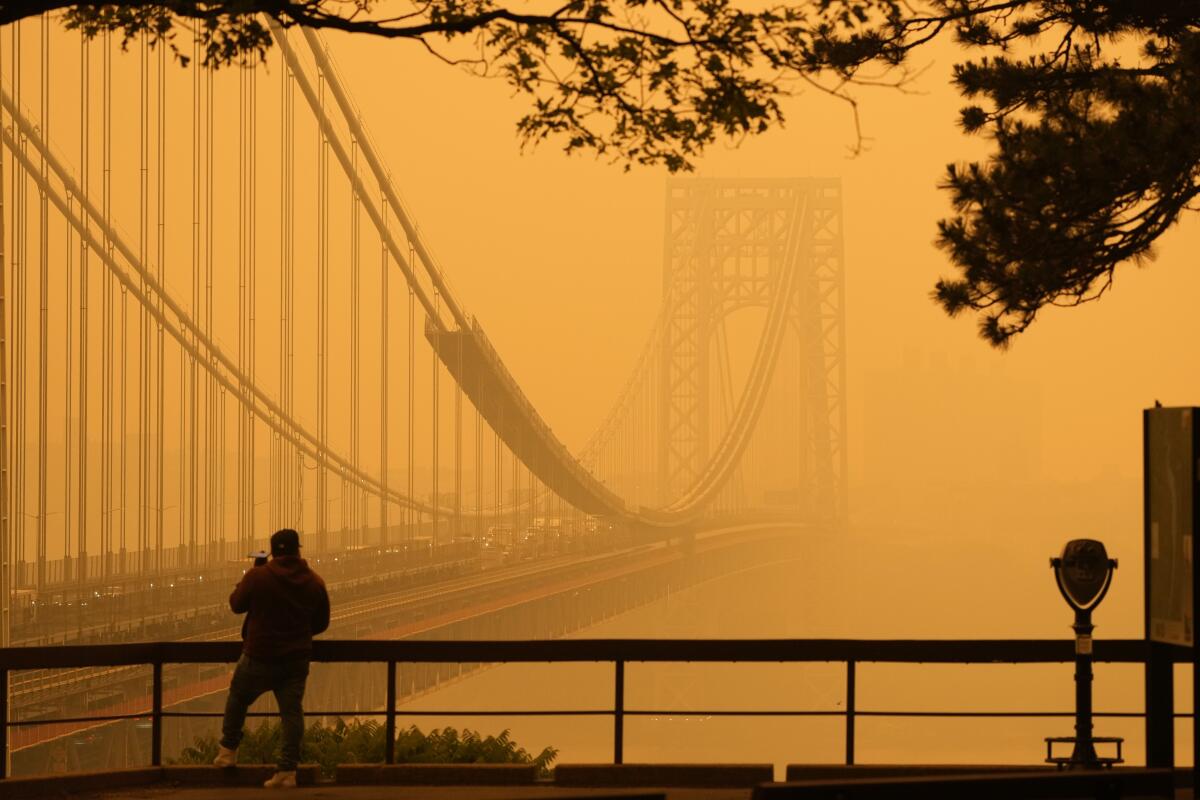Unhealthy air, smoke continue to cover large swaths of U.S. for third straight day

- Share via
Large swaths of the U.S. continue to be blanketed in a thick haze of smoke from hundreds of forest fires burning in Canada, with Thursday marking the third day of unhealthy and hazardous air quality conditions that have snarled air traffic, forced the cancellation of events and prompted numerous health advisories.
The smoke billowing across the border led officials in several states across the Great Lakes region and the Ohio Valley stretching to the Northeast and Mid-Atlantic states to extend air quality warnings until midnight Thursday.
The hazy, polluted skies and campfire smells have rattled residents across parts of the country where the threat from wildfires is uncharted territory. Residents, particularly the most vulnerable, were urged to stay indoors; others were advised to wear high-quality, N95 masks outside, an unwelcome reminder of those frightening and uncertain days of the COVID pandemic.
Flights were temporarily grounded or facing major delays at critical transportation hubs, including in Philadelphia and New York City, because of low visibility. School field trips and outdoor recess were canceled for millions of students in affected states as concerns lingered about when the smoke would lift.
According to AirNow, which offers real-time tracking of AQI, Maryland and Washington, D.C., were hotspots for polluted air Thursday, after the smoke began to travel southward from parts of the upper Northeast. The Metropolitan Washington Council of Governments, which covers D.C. along with parts of Maryland and Virginia, issued its first code purple alert, triggered when fine particulates reach very unhealthy levels — above 200 AQI — for everyone.
“There was somewhat of a windshift to bring that plume down to the south overnight last night into this morning,” said Cody Ledbetter, a meteorologist with the National Weather Service in Baltimore and Washington, D.C. Air quality alerts have been issued as far south as the Carolinas. The National Weather Service also said that air quality is likely to decline in Georgia and Alabama.
In Washington, D.C., where the air quality level was 273 as of 1 p.m. Eastern on Thursday and residents shared photos of a gloomy, apocalyptic capital early, the White House postponed its Pride event, which was expected to draw thousands of people, on the South Lawn on Thursday night to Saturday. The Washington Nationals postponed their game Thursday against the Arizona Diamondbacks to June 22, the team said on Twitter.
In New York City, which for several days running ranked No. 1 for the world’s most polluted city as indexes climbed above 400, residents woke up to hazy skies again, but air quality levels across the state appeared to improve. By Thursday afternoon, counties across New York had dropped to unhealthy levels below 200 — still above normal, but better than previous days.
Officials were urging residents to stay indoors, noting the conditions could change rapidly. New York Gov. Kathy Hochul said that approximately 1 million N95-style masks would be made available at state-owned facilities. The Belmont Stakes, a major horse racing event on Long Island, could be canceled this weekend if air quality levels creep back up above 200, Hochul said.
Residents in New Jersey and Pennsylvania — where hazardous conditions hit record levels in some areas overnight — battled another day of bad air, though dangerous conditions were dropping off throughout the day as the smoke drifted south.
The smoke blanketing the region stems from Canada, which has had an explosive start to its wildfire season with nearly 400 active blazes scorching forests around the country, about 150 of which are in the eastern province of Quebec. High temperatures and dry conditions, along with lightning, ignited the province’s fires, which swelled over the weekend and floated south across the border with the windflow.
President Biden has spoken with Prime Minister Justin Trudeau of Canada to offer federal support.
“We’ve deployed more than 600 U.S. firefighters, support personnel, and equipment to support Canada as they respond to record wildfires — events that are intensifying because of the climate crisis,” Biden said on Twitter.
An area of low pressure stalled over New England is directing the airflow from Canada, meteorologists have said. That system could shift this weekend, but the weather service warned that “as long as the fires continue, the smoke may simply be directed towards other areas of the U.S.”
More to Read
Sign up for Essential California
The most important California stories and recommendations in your inbox every morning.
You may occasionally receive promotional content from the Los Angeles Times.











